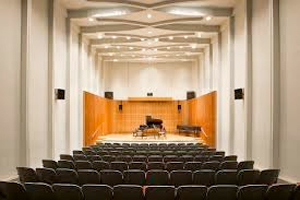by Daniel Hautzinger

The program began with an oddity, Ferdinand Rebay’s Quartet in d minor for guitar and string trio. Rebay (1880-1953) spent most of his life in Vienna and died in obscurity after being blacklisted by the Nazis, as violist and organizer of the Festival Michael Strauss explained during intermission. Rebay is so unknown that Friday night was the U.S. premiere of the work. Strauss was joined by three other Oberlin faculty members for the piece: violinist David Bowlin, cellist Darrett Adkins, and guitarist Stephen Aron, who suggested the performance.
Guitar is rare in chamber music. Rebay, perhaps understanding its lack of projection, mostly uses the guitar in the d minor quartet to flesh out the harmony or to add rhythmic excitement. And the piece is certainly vivacious, with driving, repeated rhythms and agitated textures in the first and third movements. It contained obvious influences from the Viennese lineage of chamber music, borrowing the tempestuous mood and unexpected accents of Beethoven and the harmonic shifts and tuneful melodies of Schubert. The second and fourth movements would not have been out of place in a Viennese coffeehouse. The performers allowed the former, subtitled “in the style of a lullaby,” to breathe in spacious phrases. The final movement was a set of variations on a folk song, “Song and Joy,” presented first by solo guitar. Sweet harmonics decorated one variation, Strauss and Bowlin caressed warm unison lines in another, and a fugue provided a delightful game of passing the melody.
The exception to the lightness of the concert came in the second movement of Brahms’s String Sextet in B-flat, for which Bowlin, Strauss and Adkins were joined by guest violinist Areta Zhulla and faculty musicians Kirsten Docter, viola, and Catharina Meints, cello. A highlight of the concert, the movement takes a nobly sad theme and wrenches grief from it in a set of variations, until the music ascends into the heavenly upper ranges of the violins. The rest of the work finds Brahms in a brighter mood, with the manically energetic Scherzo a fun standout. The performers demonstrated a fine sense of communication, trading melodies and cultivating an intimacy in passages for smaller sections of the ensemble. Kulas was perfect for the sextet, which sounded full-bodied and robust in the moderately-sized space.
Bowlin, Strauss, and Adkins rounded out the evening with the light-hearted first movement of Schubert’s String Trio in B-flat, where they appeared more at ease than in the unfamiliar territory of Rebay. Bowlin’s exquisite shaping of lines was fantastic, as were the beaming smiles from the three musicians during the applause, a fitting reaction to a light-as-whipped-cream “Viennese Evening.”
Published on ClevelandClassical.com January 13, 2014
Click here for a printable version of this article.



